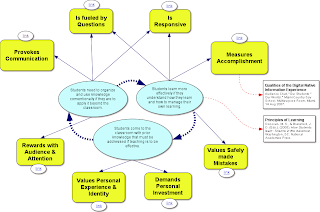From Karl Fisch:
Do you believe schools foster inquiry and passion in students? If so, are your schools currently structured to do that? Are students regularly asked to research, collaborate, create, present and network in your schools? If not, what can you do to change that."
My thoughts; I have really made a move for continuous collaboration and reworking through content and scaffolding. Students rework content in new creations and present through the wiki but need to work at different formats and more differentiation. Time to ask: What am I valuing?
From Barry Bachenheimer:
We need to unlearn that teachers give all classroom assessment. Students need to learn how to self-assess and self-reflect in order to help build independence in their learning. (There are many more in this unlearn list created by University students.)
My self-assessments need fine tuned to include what they missed during the learning process, how they re-learned, what ways of learning were meaningful to them, an action plan of what to do differently next time, etc. Has anyone used such a self-assessment?
From David Warlick: (Which sums up the pieces currently missing in my instruction. View the original and check the links.)
 My focus:
My focus:- Look at how students organize and use knowledge. Use inquiry, collaboration, and continuous feedback.
- Focus on different learning opportunities for all to succeed. Using continuous feedback (more blogging), differentiated learning opportunities, learning from mistakes.
- Tap into prior knowledge. Individual inquiry opportunities using the content and valuing unique perspectives and interests.
From Relevance of Science session at Educon:
"How can you rephrase the standards to make it more process oriented?"
This is something that has been troubling me - the focus on content (yes, I know there is a test and that PA kids performed miserably. Is it really because we are not teaching content or is it because that is all we are focused on?) My mission is to not focus on big PBL as much as inquiry and really looking at how they weave through the content. In speaking with my colleague, I believe we are doing this, but sometimes we are more effective than at other times. A good debriefing at the end of the year to see what worked and did not is a good idea (oh, and it will include student voices too.)
From Values Driven Education - What do we believe? at Educon:
No quote, just a thought. Time to really look and document what I value. Is the atmosphere I provide as well as the educational opportunities in line with the values? Is our mission statement something we do at kids, or something we are doing for kids?
Project-based learning session from Educon:
"Kids are not apathetic - they just believe they are powerless." When kids show passion about what they are learning (generally tied to a problem in society), how can we help them use the information and feel power? ...and... "Failure is okay - kids who grow up to be great social entrepreneurs had some point where students felt safe to make a mistake and try it again."Maybe grading of learning opportunities should not be a big part of the grade. The use of the information learned towards a bigger gain should be graded but allowed the opportunity to redo until they have learned. What can I do to create projects that make a difference? My personal issue I also need to work on: Start small!
Panel session on Sunday:
Chris Lehmann: "The reason some schools work is processes and habits of mind...Systems and structures in place so all the teachers can be good and excellent...Give good people the freedom and the structure...Can't cut them off from their joys and their passions.
Also: "Need to be about the right things, not catching people at doing bad things." "How do we look at children? They are not someone we get to proficient. They need to be honored and loved to be the best they can be at what they are passionate about. The scores will come.
Human capital is the most important resource and the solution to most problems. Time to embrace and support that.
From Dennis Richards Catalyst session:
"Let the teacher step out of the roll between the student and the knowledge" and "Thinking is the most important. the person who controls the learning owns the learning."
Still a question no one can answer: How do you convey to other leaders that learning is still happening if you do this? I am a firm 100% believer in this, but know many that think there is no learning unless they see the "Sage on the Stage" model.
A tweeted gem of a quote from Jasmine, SLA student:
"You cannot be a student without being a teacher and you can't be a teacher without being a student"
And from the Constructivism and Inquiry session:
"Process is more important"
... the frank discussion of how to move to inquiry reinforced many of the thoughts and problems I have encountered. SLA teachers are the best at this as it is the core of the way they teach and connecting with others who use (vs. talk about it) is the best way to challenge and reinforce your thinking. Now the hard part, refining use of inquiry in our mess of a science curriculum. How can we arrange and change courses to best capitalize on the use of process and increasing opportunities for students? (we can change things now, but does our department have the courage to look at the big picture and create change?)
Stay tuned as I continue to wrestle with these and challenge my thinking and practices.
Tags: Karl Fisch, Barry Bachenheimer, Chris Lehmann, SLA, Dennis Richards, David Warlick, educon
No comments:
Post a Comment